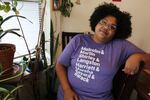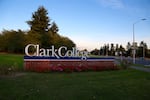About a month after the release of an investigative report detailing complaints of discrimination and offensive comments made by former Clark College president Bob Knight, a former employee at the school has filed a tort complaint alleging she was subject to discriminatory behavior while working at the college — and others are following her lead.
Dolly England was hired at the Vancouver, Washington, community college in 2015 as the school’s diversity outreach manager in its Office of Diversity, Equity and Inclusion.
She left the school last year and now works in the reproductive health field.
She filed a complaint with the federal Equal Employment Opportunity Commission in March and a Washington state tort claim earlier this month. Both can serve as intent to file a lawsuit, said England’s attorney, Sue-Del McCulloch.
England’s complaint filings summarize her experiences of being “sidelined, disrespected, denied employment opportunities, devalued and demeaned” due to her race and color while at the college, by her direct supervisor, Knight and the school itself.

Dolly England said she left Clark College last year after dealing with racial discrimination and a hostile work environment.
Molly Solomon / OPB
England is a dark-skinned, mixed race, African American woman.
England worked as a job recruiter for the school, specifically focused on diverse hiring, and said she really enjoyed the position when she started.
She also enjoyed working in the Office of Diversity, Equity and Inclusion in general. She described it as “the most magical place.”
“We would have all kinds of people come in, both students and a lot of community members as well,” England said. “We were known as this place you could come by at lunchtime and microwave your lunch and hang out and meet some new people.”
She said things took a turn when Loretta Capeheart — the school’s former vice president of Diversity, Equity and Inclusion — was hired in 2017.
Related: Longstanding Equity Issues At Clark College Alienate Staff, Students
Capeheart’s hiring was announced via campus-wide email, and England’s office was not informed of the hiring ahead of time, which she said was a usual practice for the school.
Capeheart acted as England’s direct supervisor.
“When Loretta came on, it seems like almost like someone else was telling her like, ‘Get them under control,’” England said.
She said with Capeheart’s hiring, new policies were implemented for the office, like staff having to seek permission prior to attending meetings, documenting where and when meetings were and bringing back agendas from those meetings — “Things that literally no one else on campus had to do, but our office all of a sudden had these policies,” England said.
“I wasn’t allowed to go out into the community like I was,” she said. “I had built so many relationships, and so many people kept asking me to come out and do things, and I was having to tell people no and folks just didn’t understand.”
Another new policy banned food from the office, and the communal microwave was removed.
“It was like the mission of the Diversity Center changed when she [Capeheart] was hired,” England said.
This was a shift that others at the school had also felt, according to previous reporting by OPB.
England said she and the rest of the diversity, equity and inclusion staff met with Knight to discuss Capeheart’s hiring, but “he was dismissive and insulting and repeatedly said he expected us not to cooperate with the new hire because she was not our first choice,” her EEOC complaint states. “President Knight’s comments were baseless, belittling, unprofessional and disrespectful toward the team.”
England also said Capeheart denied her the opportunity to apply for the school’s multicultural student affairs position, an extra position on top of England’s job at the time that would have allowed her to interact more with students of color.
“I was really transparent that while I was good at doing the HR role, it wasn’t my passion and I really wanted to get to a place where I got to work with students,” England said.
England needed Capeheart’s permission, as her supervisor, to apply for the position, but Capeheart refused, England said, implying that she would only “take the title and not do the work.”
Throughout that time of new policies and Capeheart’s arrival, England stated in her EEOC complaint, England experienced “race-based harassment from College President Knight, who made public comments to me, particularly when I was with other women of color, saying we were ‘trouble’ and that he had ‘lost control’ of us long ago.”

A sign marks the Clark College campus in Vancouver, Washington.
Molly Solomon / OPB
Last month, an investigative report compiled by an outside consulting firm for Clark College echoed similar complaints from women and people of color in regards to Knight.
“To do equity work, and to work with a leader who was literally starting from zero when it comes to understanding power and privilege, and to have it be his job to lead and make sure that this equity work is being implemented was discouraging,” England said of Knight. “My experience with him is that he is really about checking some boxes, and for appearance's sake, making sure that he’s got representation of those boxes in his staff.”
During her time at the school, as a part of her job duties, England said she confidentially met up with the vice president of human resources on behalf of a staff member in a protected class who had come to her for help with a “sensitive accommodation issue.”
She said she was retaliated against for assisting that staff member.
“I later learned that the staff member’s confidentiality had been breached, personal medical information was shared with the employee’s team and that [the school] lied and blamed me for the breach during the resulting complaint and investigation,” England’s EEOC complaint states.
England said the continued comments from Knight and the ongoing interference with her job from the new policies created a hostile and stressful work environment to the point of making her physically ill.
She went on leave from her job due to work-related stress in late 2017 to early 2018.
When she returned from leave, she gave the school her resignation notice and said she had effectively been forced out of her job.
“I have been really sick dealing with this. The day I came back from FMLA was to give my notice. The only reason I came back was to give notice,” England told OPB. “It continues to impact my health. I will never be the same.”
When a lawsuit will be filed will depend on reaction from Clark College, England's attorney McCulloch said, as torts and EEOC complaints can also lead to more general negotiations and discussions between parties.
“In general, you would look at the response from the employer and how responsive that response is,” McCulloch said, “if it’s actually indicative of something enough and if it seems worthwhile to actually engage in some kind of a discussion at that point.”
McCulloch said she’s talked with others associated with Clark College, and that additional people may take legal action due to discriminatory treatment they experienced at the college.
McCulloch said she is submitting another tort claim from former employee Summer Brown against the college this week. Brown was Clark College's only black counselor at the time when she quit her tenure-track position in March of 2018.

Summer Brown was Clark College's only black counselor. She left her tenure position in March because of what she considered a toxic work environment for people of color.
Contributed by Summer Brown
“This kind of discrimination is both very systemic and endemic of the environment that has been allowed to flourish there, but it’s also very, very personal in the interactions,” McCulloch said. “So I’m foreseeing that it won’t be a group action but very closely related individual actions.”
McCulloch continued: “The ongoing culture of discrimination at Clark College is particularly distressing and damaging because Clark College is a public institution intended to be a gateway to higher education, where everyone should be welcomed and supported and no one, student, staff or faculty, should be marginalized or tokenized.
"Clark College has been visibly pushing the notion of diversity, but it has been proforma, making the discrimination especially painful for those who have been used by the college as examples of its ‘commitment’ to diversity," she said.
Related: Report: Former Clark College President Discriminated Against Women, People Of Color
When England was at the school, and since she has left, she said there have been more people of color hired at Clark College, “but if somebody doesn’t speak out now, what happened to me will happen to every single one of them,” she said.
“This is my community. I’m not going anywhere. I have very high expectations and I will be watching.”
Clark College declined to comment on England's allegations, but confirmed it received her complaint from the Washington attorney general’s office.
“The AG’s office will investigate and then inform the college of next steps,” Kelly Love, Clark College’s chief communications officer, said. “The college has no comment on the complaint because it is both a personnel and a legal matter.”
Knight stepped down from his position last summer, and the college is currently narrowing down finalists for its new president.
“Whoever they hire needs to have cultural competency,” England said. “They need to come in understanding the deep hurt and trauma students, faculty and staff have experienced, due to the ignorant and dare I say racist leadership.”
At its most recent meeting, the school's Board of Trustees identified four potential candidates for the position. The school expects to decide on its new president by late February.
